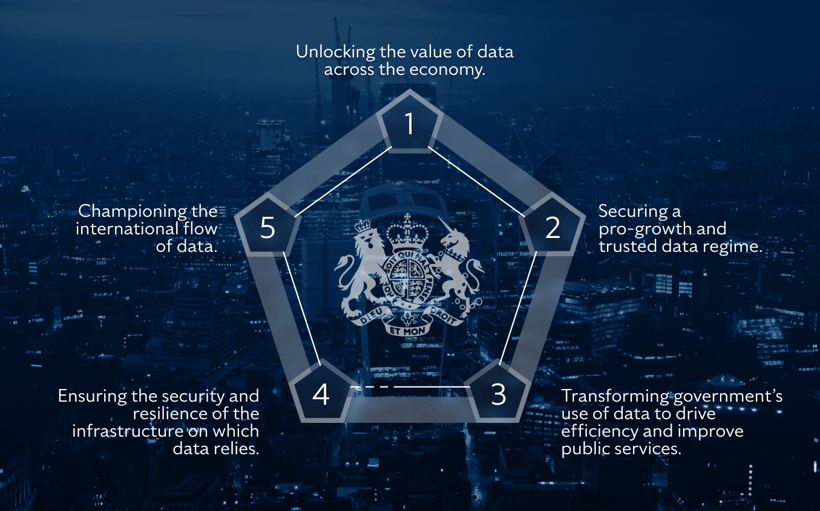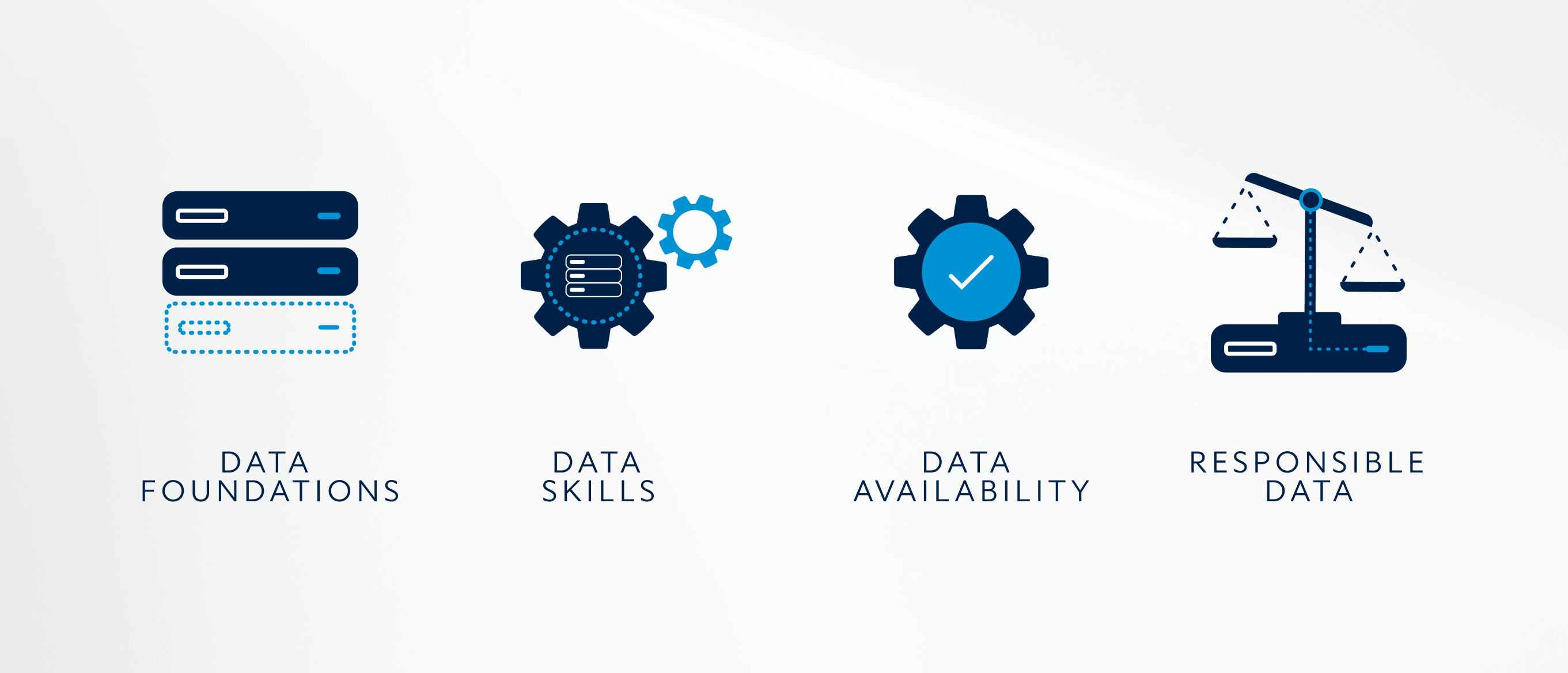AI-enabled Acoustic Intelligence for Anti-Submarine Warfare
From detecting hidden threats to defending critical underwater infrastructure, Anti-Submarine Warfare (ASW) is a cornerstone of national security. AI...
7 min read
Mind Foundry
:
Updated on April 9, 2024

In June 2019, the government launched a call for evidence on the proposed framework of a strategy around data usage in the UK, receiving over 100 responses. At the same time, the government undertook a programme of roundtables, workshops, and webinars to ascertain the parameters, objectives, and evidence supporting what would become the National Data Strategy.
The Strategy, released in September 2020, is a substantial and detailed amalgamation of case studies, statistics, and proposals for the future of data in this country. The permutations for the country’s future relationship with data are significant, but in a recent survey about AI in the Public Sector, 71% of respondents said they hadn’t even read the strategy at all. Since the Government’s plans will have a significant impact on every aspect of data in the UK, from how data is created to how data is stored and then used, we put together this resource to help familiarise you with the most important parts of the UK Data Strategy. Let's begin.
.png?width=1511&name=Governments%20National%20Data%20Strategy_%20What%20is%20Data%20(2).png)
The Data Opportunity
The government’s strategy defines data as information about people, things and systems, and the acceleration of growth in the scale and ubiquity of this data mean that its importance to businesses and organisations of all sizes has also grown exponentially. Indeed, the explosion in the proliferation of data is such that “it is increasingly easier to identify the few human activities that do not generate data than those that do”. Not only is there more data now than ever before, but according to Brian Mullins (CEO of Mind Foundry) “navigating this dense data landscape has provided us with architectures, technologies, and even entire industries dedicated to the pursuit of insight and intelligence”. The Government believes that by acknowledging these realities, and by strategising from this knowledge, we have a tremendous opportunity to achieve the following:
Boosting productivity and trade
Supporting new businesses and jobs
Increasing the speed, efficiency and scope of scientific research
Driving better delivery of policy and public services
Creating a fairer society for all
The UK is already a leading digital nation with “the largest data market in Europe” according to the Strategy. However, despite this, we are still faced with numerous barriers that prevent us from truly maximising the potential of our data. If we are to consolidate our position as an international data leader, then we must leverage our existing strengths in order to boost the better use of data across businesses, government, civil society and individuals.

The Mission To Unlock Data’s Potential
Upon taking stock of the country’s current data landscape, the Government has identified 5 priority areas of action that it describes as the 5 Missions. The hope is that by delivering against these “missions”, the government will “create the optimal environment for data to drive growth and productivity in the UK for the benefit of all”.
These 5 Missions are:
1) Unlocking the value of data across the economy.
To ensure the UK is a world leader in data, the first mission will be to set the correct conditions to make data usable, accessible and available across the economy while protecting people’s data rights and private enterprises’ intellectual property.
2) Securing a pro-growth and trusted data regime.
The UK’s data regime should support vibrant competition and innovation, building trust and maintaining high data protection standards without creating unnecessary barriers to data use. Both businesses and people should be active agents in this change. Businesses and other data-using organisations should be clear and transparent about how they collect and use data responsibly, and people should be empowered to choose whether and how to share data in both the public and private sectors, including where the use of their data can help others.
3) Transforming the government’s use of data to drive efficiency and improve public services.
We need a whole-government approach that ensures alignment around the best practices and standards needed to drive value and insights from data. We also need the right skills and leadership within the public sector to understand and unlock the potential of this data. In order to make this happen, we will need to drive change across five key areas:
Quality, availability and access
Standards and assurance
Capability, leadership and culture
Accountability and productivity
Ethics and public trust
4) Ensuring the security and resilience of the infrastructure on which data relies.
With data becoming an increasingly integral part of modern life, we need to ensure the infrastructure underpinning it is safe and secure. The Government has a responsibility to ensure that data and its supporting infrastructure are resilient in the face of established, new and emerging risks, protecting the economy as it grows.
5) Championing the international flow of data.
The coronavirus pandemic demonstrated clearly how sharing health data can aid vital scientific research into diseases while uniting countries in their response to global health emergencies. The Government will promote domestic best practices and work with international partners to ensure data is not inappropriately constrained by national borders and fragmented regulatory regimes so that it can be used to its full potential. Using their international engagement and influence, the Government will:
Build trust in the use of data
Facilitate cross-border data flows
Drive data standards and interoperability internationally
Drive UK values internationally
If all of these areas of action are successfully addressed, then our government, our organisations, our businesses, and we as individuals will be well on our way to maximising the benefits of data and ensuring it continues to pave the way towards a prosperous future.

The Pillars That Define The Strategy
The period of consultation and the call for evidence that preceded the strategy revealed the existence of a wide range of “interconnected issues that currently prevent the best use of data in the UK”. These provide the basis for the 4 pillars of the strategy, which outline the nature of some of these issues and why addressing them is so crucial to the success of the strategy.
1) Data Foundations.
By improving the quality of the data, we can use it more effectively and drive better insights and outcomes from its use. Current problems include siloed and antiquated data structures that have scalability, latency and accessibility issues. We must address these issues in the following 3 areas to get the most out of our data.
Data foundations in the wider economy and society: Steps must be taken to improve data quality in these areas, including consolidating a clear framework for government action in the wider economy.
Data foundations across government and the wider public sector: The creation of a Data Quality framework is one of the steps taken to address data quality issues and technical barriers to data use and reuse across government. Other steps include the establishment of a Data Standards Authority and the recruitment of a Chief Data Officer for Government.
Supporting data foundation internationally: To become a global data champion, the Government pledges to support the global effort on data interoperability, which will facilitate the combination and cross-referencing of different data sources, and to collaborate with our international partners to build strong national statistical systems to drive economic growth and help to deliver inclusive, effective services.
2) Data Skills.
By improving clarity and coordination, ensuring formal and vocational education rises to the challenge, and driving data skills across the public sector, we can ensure the delivery of the right skills through education and make sure people can continue developing these skills throughout their lives.
The Government aims to achieve this with 3 key actions:
Driving clarity and coordination: This will include publishing a working definition of data skills for the wider economy, setting out a clear distinction between data skills, digital skills and AI skills, and considering the benefits of providing information on pathways into data-related careers.
Ensuring formal and vocational education rises to the challenge: The Government will work with the appropriate bodies in schools, universities, and vocational education, in order to understand the best ways to integrate data skills into the education system.
Driving data skills across the public sector: capability, leadership and culture: With further measures to be announced as part of the Digital Strategy and through the National Skills Fund, the Government will prioritise bringing in and building the right skills across government, as well as recruiting leaders with data and digital skills across government to build a strong cadre of technical, policy, legal and analytical data experts in the centre of government.
3) Data Availability.
Cultivating high-quality, valuable data is only useful if that data can be easily accessed and distributed across multiple channels. The Government will aim to improve data availability across 3 main areas: the economy and society, within government and the public sector, and internationally. Encouraging better coordination, access to and sharing of data of appropriate quality between organisations in the public, private and third sectors and ensuring appropriate protections for the flow of data internationally are all critical to the success of the strategy. Achieving this will require a thorough review of existing systems to identify which areas are in need of improvement.
4) Responsible Data.
As we drive increased use of data, we must ensure that it is collected, shared, and used responsibly. This must be done in a way that is lawful, secure, fair, ethical, sustainable and accountable while also supporting innovation and research. Fundamental to achieving this is securing a pro-growth data rights regime and promoting data use that is secure and sustainable. This will require actions from all levels of society, including in government, organisations, and as individuals. Pivotal to this action will be collaboration and consultation with the Centre for Data Ethics and Innovation (CDEI), founded in 2018 to advise on data-driven technologies and AI, which will help to ensure that data use going forward is not only secure and responsible but is ethical and sustainable as well.
What Are The Next Steps?
The focus of this strategy has been on identifying the areas of concern when it comes to maximising the potential of the UK’s data and providing an outline for how the Government plans to address these concerns. These plans of action range from pledges of further research to concrete commitments such as the launch of a Data Quality framework and promoting the use of the government’s Data Ethics Framework across the wider public sector. In truth, though, the main purpose of the strategy going forward is to open up a discussion between the Government and the wider society, including organisations, businesses, and individuals, on the merits of the strategy itself. The optimisation of the UK’s data landscape is only possible if there is buy-in across society because “given the cross-cutting nature of data, collaboration across a wide range of sectors and organisations will be essential”.
What are the takeaways from the strategy?
The transformational potential of data is limitless, whether it be to boost productivity and trade, support businesses and create jobs, or help create a fairer society for all. However, the data landscape is constantly changing, and consequently, the way that we use data must evolve as well. As a result, companies that understand the value of data and who have the technological resources to maximise its potential will be invaluable to the wider society going forward. When it comes to Artificial Intelligence, data is an essential piece of the puzzle. Here at Mind Foundry, one of our core capabilities is to use Machine Learning to extract information from data by filtering out the “noise” to get to the information we need to solve high-stakes problems where decisions affect individuals and also at the scale of populations. This aligns perfectly with the strategy, in particular, the need for a responsible approach to data that considers the ethical impact of our decisions. However, the optimisation of the UK’s data capabilities is an ongoing process, and so decisions and processes must be constantly monitored and evaluated to make absolutely certain that the benefits of data are shared equally between all areas of society.

From detecting hidden threats to defending critical underwater infrastructure, Anti-Submarine Warfare (ASW) is a cornerstone of national security. AI...

The UK-USA Technology Prosperity Deal sees overseas organisations pledging £31 billion of investment into UK AI infrastructure. As AI investment...

Industrial AI is increasingly coming to the fore in physical industries, but achieving measurable real-world impact requires careful consideration...